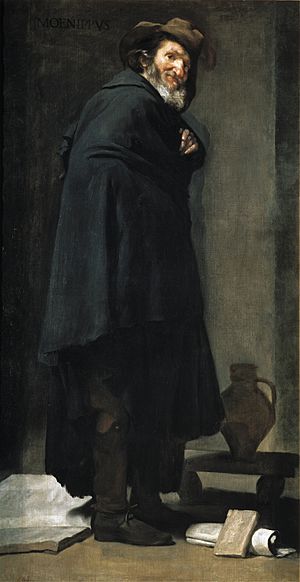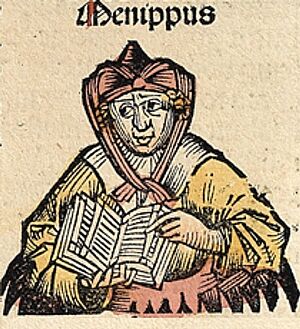Menippus facts for kids
Menippus of Gadara (/məˈnɪpəs/; Greek: Μένιππος ὁ Γαδαρεύς) was an ancient Greek writer who lived around the 3rd century BC. He was known for his funny and often critical writings, especially his unique style of satire. Satire is a way of using humor, irony, or exaggeration to make fun of or criticize people's mistakes or foolishness.
Menippus was a follower of Cynicism, a philosophy that taught people to live simply and reject many common desires like wealth and power. The special type of writing he created, called Menippean satire, is named after him. Sadly, all of his original works are lost, but they greatly influenced later writers like Varro and Lucian. Lucian even considered Menippus one of the most important Cynic thinkers.
About Menippus
Not much is known about Menippus's personal life. He came from Gadara, a Greek city in an area called Coele-Syria (which was part of ancient Phoenicia).
Menippus was born a slave. He worked for a person from a region called Pontus. However, he eventually gained his freedom and moved to Thebes. There's a story that he made a lot of money by lending it to people.
His Writings
Menippus's writings were a mix of prose (like regular stories) and verse (like poems). Even though his works are lost, we know he liked to discuss serious topics in a funny way. He especially enjoyed making fun of other philosophical groups, like the Epicureans and Stoics.
People called him the "earnest-jester" (Greek: σπουδογέλοιος, spoudogeloios). This means he was someone who could be serious and funny at the same time. His writing style was very influential. The genre of Menippean satire is named after him because of his unique approach.
Even though Menippus's own writings are gone, we can still see his influence. For example, parts of Varro's Saturae Menippeae were written in a style that copied Menippus. Also, Lucian, who admired Menippus, wrote a dialogue called Menippus. This dialogue might have been inspired by one of Menippus's own works called Necromancy, which was about talking to the dead.
Here are some of the works that historians believe Menippus wrote:
- Necromancy (Νέκυια) – This title means "talking to the dead."
- Wills (Διαθῆκαι)
- Letters artificially composed as if by the Gods (Ἐπιστολαὶ κεκομψευμέναι ἀπὸ τῶν θεῶν προσώπου)
- Replies to the Natural Philosophers, and Mathematicians, and Grammarians (Πρὸς τοὺς φυσικοὺς καὶ μαθηματικοὺς καὶ γραμματικοὺς)
- The Birth of Epicurus (Γονὰς Ἐπικούρου)
- The School's reverence of the twentieth day (Τὰς θρησκευομένας ὑπ' αὐτῶν εἰκάδας) – This refers to a special day celebrated by the Epicurean school.
Other writings mentioned include Symposium (a type of discussion) and Arcesilaus. There was also a work called Sale of Diogenes (Greek: Διογένους Πράσει). This work seems to be the main source for the story that Diogenes of Sinope, another famous Cynic, was captured by pirates and sold as a slave.
See also
 In Spanish: Menipo de Gadara para niños
In Spanish: Menipo de Gadara para niños



